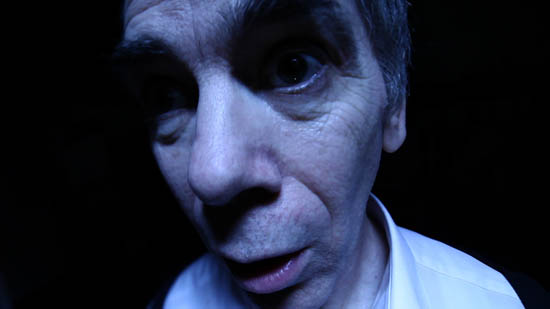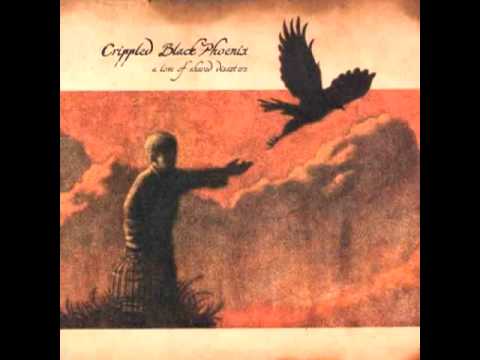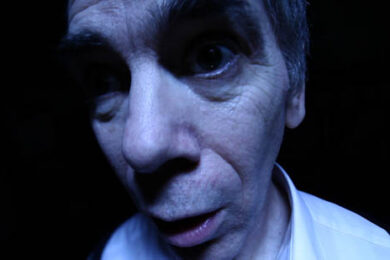A few months back, The Quietus sent me off to The Lexington in Islington for a meet up with director/writer Sean Hogan and his friend Justin Greaves of musical collective Crippled Black Phoenix to discuss the ins and outs of their audiovisual collaborations. Justin is the brains behind the brawn of Crippled Black Phoenix, a group who have featured a variety of well respected musical explorers and whose travels have most recently taken them to China. Hogan has just wrapped up his third feature length film and has a fourth currently in pre-production. Like the defiantly independent Crippled Black Phoenix, the Little Deaths director is keen to maintain creative control, something he’s finally gained with his upcoming film, The Devil’s Business, which is being shown at Film4 FrightFest this weekend.
The three of us flew through several hours of the sort of banter one would expect from old friends, Sean and Justin finishing sentences and in-jokes. It proved a rare opportunity to eavesdrop on a conversation between two experienced specialists in their respective fields, and an insight into their collaborative process.
Sean, how did you come to find out about Crippled Black Phoenix?
Sean Hogan: It was actually a friend of mine who said, ‘Oh you’ve got to check out this band, they’re great.’ And so, eventually, I ended up listening to a lot of Justin’s stuff while I was writing the script for The Devil’s Business.
It inadvertently worked its way in, then?
SH: Well, I always make a playlist when I’m writing. Whether it’s musically or lyrically or whatever, it’s just kind of stuff that feeds into my thought processes when I’m writing and – this is kind of jumping ahead slightly – but certainly there was this one track of theirs, Sharks & Storms, that I was listening to. And for some reason, it got into my head when I was writing that script and I would play it fucking incessantly. [laughs]
And Justin, you’re always talking about the cinematic element to your music anyway?
Justin Greaves: Well, I’m really interested in actual soundtracks, not compilation albums that are put together for a film or anything like that. I’m into the actual incidental music. And some of the stuff that I’ve done has been sort of influenced by certain artists, like Morricone and Claudio Simonetti, y’know, Goblin and John Carpenter and people like that. And I can remember using the Juno-6, because it was like having a ‘John Carpenter sound’, you know. [laughs]
SH: That was the thing for me. When I started listening to these guys, the music just seemed very cinematic. So I spoke to the guys that were producing the film with me and I said, ‘Look, there’s this band that I really like and there’s this one piece of music I think would be great for the film’. I only had it in my head that we would use that one track.
So we met and sort of said, ‘Okay, so we’ve got this film we’re doing and there really isn’t any money in it blah, blah, blah, but we really want to use this track etc, etc.’ And [Justin], you were like, ‘Yeah, that’s perfectly cool if you want to do that, but wouldn’t you rather I wrote all the music for the film?’ [laughter] And I was like, ‘Give me a minute to think about that [laughter] – yes!’
JG: I just don’t do anything by halves, that’s all. [laughter]
Had you seen Lie Still by this point?
SH: He still hasn’t seen it. [laughs]
JG: The first thing I’ve seen really is Little Deaths, and then a rough edit of The Devil’s Business. But I think it was the sort of pedigree and more the attitude, where they’re coming from and what kinds of things they’re into more than anything. That really pricked my ears up to it. It was independent, and they were trying to do something that was being controlled by the artists and by the filmmakers, which totally appeals to me.
SH: So what happened was, we were already talking about The Devil’s Business at this point, and Little Deaths was in post production, and we already had a composer who had been signed on for ages, who shall not be named, and then basically at the last minute he turned around and said, ‘Oh, I can’t do it after all.’
And I was like, ‘Shit, I’m really screwed.’ Obviously I was already working with Justin at this point on The Devil’s Business but part of me didn’t want to go to him with it because there wasn’t really enough time to start from scratch and begin composing stuff. And we were having some other difficulties that I really didn’t want to drag him into. But ultimately, I was really in a corner, so I basically went to Justin and I said, ‘Look is there any way that I can use Crippled Black Phoenix’s music, your existing music to score the film with?’ And he was like, ‘Yeah, absolutely – what do you need?’
So you’re doing Little Deaths, The Devil’s Business and you were talking about an upcoming project?
SH: Well we’re also doing a short film for Film4 FrightFest this year – a group of UK horror directors are all making these short homages to John Carpenter movies, and I got The Thing, which I’m really excited about doing. But that’s only a little project and that’s going to be fun to do but otherwise I’ve got two projects that are in development at the moment. The first one looks like it’s going to be this film called The Girl in the Mirror, and is basically a kind of Polanski-esque psychological horror movie about a paranoid schizophrenic. And so, the interesting thing with that one will be – because schizophrenics have a lot of audio hallucinations – getting into real texture and noise and playing around with, not necessarily melody, but all of those kinds of soundscape-kind-of-things.
So what sort of role do you think music plays in a film?
JG: Oh it’s super important, you know. Because if music on a film doesn’t particularly work, you really notice it. You think, ‘Wow that’s really out of place.’ A case in point was The Walking Dead. And the first episode was really good, a lot of sort of incidental music and it was all working and then right at the end they just stuck this weird kind of pop song on at the end. And it just stuck out so much.
SH: The thing that always used to wind me up about horror movies in the 80s is that they would always slap on a metal song over the end credits [laughter]. And it was always really incongruous. Don’t get me wrong, I grew up loving horror and loving metal but they were not necessarily two things that should go together, you know.
JG : Yeah, yeah.
SH: And equally when Argento started using metal songs on his soundtracks, it was like, that really doesn’t work, give me Goblin any day.
But I mean, you’ve referenced Morricone, Goblin and, y’know, Carpenter…
JG: Yeah, well they’re the big ones, I would say.
..But all three of them, you can really notice them, I mean the music jumps out.
JG: Yeah, well, there’s a lot of Carpenter stuff that you wouldn’t necessarily automatically think, ‘Oh, this is a song on a film.’ You could be watching a film and it will have his music going on and you won’t really notice, it but then at some point you’re thinking, ‘Wow, that soundtrack is really …’. Because it gets in there anyway, whether you realise it or not, and I think to have those parts of music that can be subconscious but still stick in the mind is probably quite a tricky thing to do. I think if it happens it’s probably more down to luck than anything [laughs].
I think what people probably struggle to realise is – especially sometimes, when people are a little bit more kind of self-centred about their music on a film – they see it as an opportunity to write music for a film and they run away with it a bit, and they kind of say, you know, ‘This is my chance to shine,’ sort of thing…
SH: I’ve always been of the opinion that there’s nothing worse than overscoring a film, that you should never have too much music in a film. And I’ve always tried to keep music to a minimum and balance it out, because I really like using sound design as well and so it’s about keeping the right balance between music and sound design.
But equally, [when] working with Justin, because I really like what he does, I’ve got to be aware of not being like the kid in the candy shop going, ‘No, I need more, more, write me more!’ So it’s all about keeping that balance.
So what are you looking for from him for The Devil’s Business?
SH: Well, The Devil’s Business is an interesting one because it’s very intimate and it’s quite dialogue-heavy. So one of the conversations that I’ve had with him is that a lot of this is going to need to be really quite subtle. It’s a very moody, atmospheric film, so there does need to be a lot of sound design and music, and there’s certainly scope for that. But equally it can’t get in the way of what people are saying. So it’s a kind of balancing act to walk with that one. Although there are times in the film where I’ve basically said, ‘Look, this bit here is where I’ve left for you to go nuts.’
You know, Little Deaths was obviously the first one to be finished but that wasn’t a proper experience of working with Justin as a composer. And actually the way I like to work with a composer is to get them involved as early as possible, which doesn’t always happen on films. And then it’s just a constant to and fro process, and so that’s kind of pretty much what we did…
JG: Yeah, I think there has to be sort of a starting point somewhere, whether it’s way off the mark or nailed on the head. But there’s absolutely no point in waiting until the film is done and edited and then trying to look at it and write to it, you know. So it all helps, but being involved right from the start you get to know the film so much better than you would do otherwise.
So are you also working on a documentary now?
SH: Yeah, we have started to talk about doing something. It is kind of in the very early stages at the moment and we’ll see what form it takes, but…
JG: It’s going to turn into a horror film [laughs], without even trying.
SH: Yeah, Justin basically said, ‘Oh well, we’ve got a lot of stuff coming up, we’re touring and we’re going back into the studio and all of this kind of thing, and wouldn’t it be cool to do a little documentary-type thing?’ And I was like, ‘Yeah, absolutely, I’d love to do that.’ So we’re sort of in the very early stages and starting to shoot some footage of rehearsals and stuff like that and just kind of doing, I don’t know, A Year In The Life Of… or whatever else.
JG: Yeah. If I had my way, Sean would just come with us on tour and be the guy there who is capturing everything else, because it’s everything that normally happens off camera that’s the really interesting stuff, you know, all the fights and everything else [laughter]. That’s really what you want to get, you know…
SH: I like the idea of it being this ongoing thing that, who knows where it will go?
JG: I mean it would it would be the most chaotic, depressing, nail-biting… It would just be utter misery sprinkled with complete ridiculousness and a whiff of the macabre [laughs]. It would be…yeah, Confusion with a Whiff of the Macabre. That’s going to be the title.
The Devil’s Business plays FrightFest on Saturday 27th and Monday 29th August.




